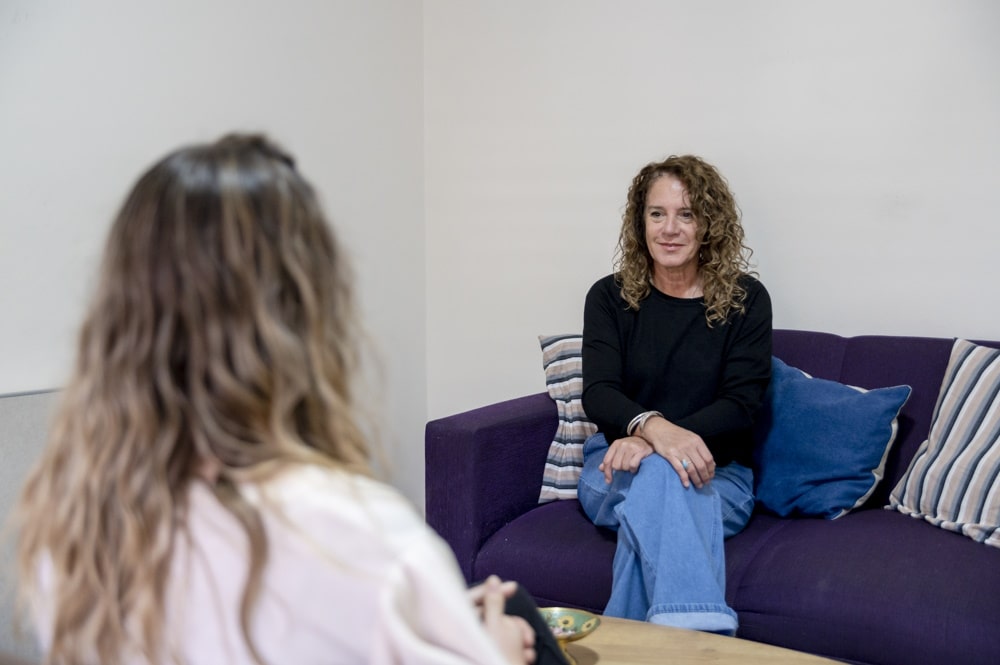‘In this space all thoughts and feelings are welcome.’
I find myself re-assuring clients with this phrase from time to time. It is the ultimate permission-giving invitation!
As far as therapy conversations go, it is not uncommon for new, or existing clients to hesitate, or hold back due to a fear of oversharing. While there are certain boundaries to maintain, we’ll be exploring whether there are limits to the depths of our conversations and if you can indeed ‘overshare’ in therapy.
Should I Tell My Therapist Everything?
Whatever you are thinking, you are welcome to share it with me. Whatever you have ever said to yourself, you have permission to speak it into this space. Whatever you feel, no matter how difficult it may be for you, each and all of your emotions are welcome in this space.
There are very few relationships, and relational spaces, where such an invitation is given with authenticity and where the relationship can hold and contain whatever the thought or feeling! For me, this is one of the greatest gifts counselling and psychotherapy has to offer. As far as I’m concerned, there is no such thing as oversharing in therapy.
With a therapist, we can say whatever we think, or have ever thought, about ourselves or another person, and know that it will be welcomed, heard, held without judgement and with curiosity.
Some of us have people in our life who can be this for us: perhaps a family member, friend, or colleague. However, in such relationships, we have an emotional connection where we care about the impact of what we share on the other person. This means we may at times hold ourselves back, or censor what we share and when we share it, for fear of overwhelming, or hurting, the other.
With a therapist though, we are free of any such responsibilities. We are free to speak and share without monitoring and editing ourselves. Our therapist can withstand anything that we say, or feel. A therapist can be with us in our thoughts and feelings, welcoming them, holding them, being curious about them. This quality of presence witnesses to our experience, we feel validated. This unguarded and undefended expression of our thoughts allows us to be curious also about what we think, what we say.
Sometimes in our awareness, sometimes on the edge of our awareness and sometimes outside of our awareness, we think things which seem unsay-able. It may feel too dangerous, too embarrassing, too shaming, to say such thoughts aloud. But with the relational space of talk therapy, we are presented with a time and place where we can give ourselves permission to say aloud the unspeakable and to see what happens.
What is it like to hear myself say that? What do I notice? How does it feel? These are all questions we may explore further in your sessions.
Can You Overshare in Therapy?
Is there something stopping you saying certain things in therapy? If you have a relationship with your therapist where you feel contained, safe, warmth, acceptance, and curiosity, could it be your own sense of guilt or shame preventing you from sharing? Whilst this is understandable, this is where the role of the therapist becomes vital.
Open curiosity with warmth from a therapist about topics like money, sex, abortion, death & dying, and suicide, is an invitation and a gift. In a world where hot button subjects such as these may be responded to with judgement and shame, therapy becomes all the more important.
In therapy, there is a freedom to notice and explore, which is why I find the saying ‘In this space all thoughts are welcome’ is so prevalent. When I hear myself saying these words as a therapist, I recognise that I am sharing an invitation to one of the most astonishing gifts any human being can experience: to speak freely and to share thoughts and feelings with another human being with open curiosity and warmth, where I am prized as a person.
If I experience my therapist brushing off, avoiding certain thoughts, or topics, that is something to notice and communicate back to them. As a client, my hesitation, or inability, to say something in session may be due to my therapist’s own inability to welcome and hold a particular topic, or theme, and this does happen from time to time.
Whilst it is not possible to overshare in therapy with a therapist who truly welcomes all thoughts and feelings into the space, occasionally a therapist may not be able to hold what a client brings.
What Not To Say in Therapy: Is There Such A Thing?
Swearing in sessions, rather than the option to swear, is worthy of mention. I do wonder about the vocabulary used in session by the client and therapist, compared with the range and richness of language they use in the world. I recognise that swearing is on a spectrum and opinions vary as to what counts as a profanity.
In my experience it is a minority of clients who swear in session with openness and ease (more common is an apology after swearing). When this happens I aim to use comparable language in the same session, attuning with the client, and signalling that all words are welcome, without explicitly needing to say so.
Sometimes when I use ‘swearing vocabulary’ and a client hasn’t done so previously, I can see a flash of relief across a face, occasionally followed with gratitude that such language is welcome. ‘I have a potty mouth’, may be shared in my therapy sessions.
My interest is to help create with a client a therapeutic relationship in which the client is at ease and free to express themselves however they wish. However, I may intentionally drop into my response swearing language and it isn’t reciprocated by the client. Their face may register shock, sometimes with a whiff of disapproval. This too helps me to know what vocabulary serves the relational space.
What not to say in therapy: all thoughts and feelings are welcome, including swearing. Everything can serve the therapeutic process when there is open curiosity with warmth, and without judgement. Swearing in therapy is entirely down to you!
There’s No Such Thing As Oversharing In Therapy With Mark Greenaway-Robbins
First and foremost, you should feel comfortable and at ease with your therapist. While voicing your thoughts and feelings can feel scary, everything you say should be respected and heard without judgement.
Generally speaking, there are very rarely therapy conversations that cross into ‘oversharing’, however this is subjective to you and your views. At the end of the day, you have control over what you would like to discuss in these sessions.
Whatever you are going through, you need not go through it alone. If you are looking for a way to open up about your issues, I’m here to help you. Contact me here whichever way you feel most comfortable with.



